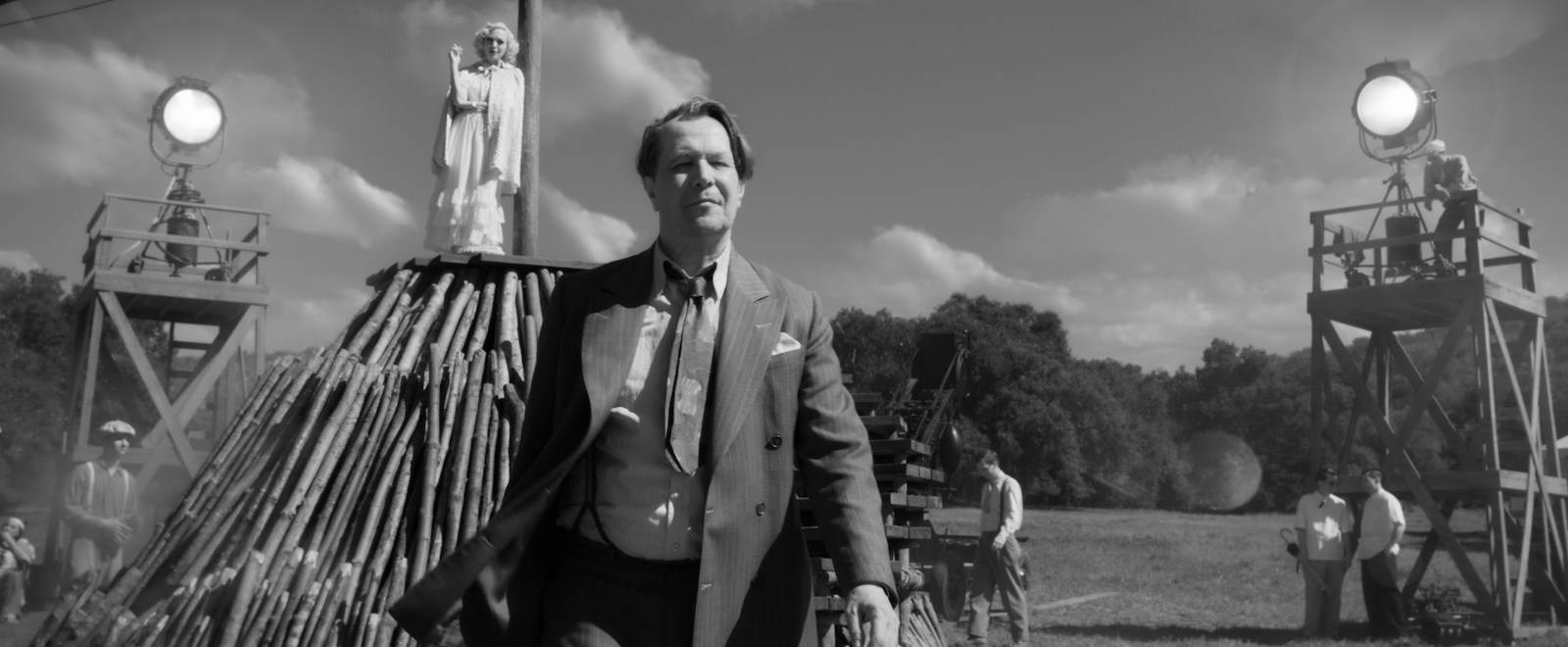
All the ingredients are present in David Fincher’s Mank. It’s an extremely well-crafted film, with beautiful acting performances, directed by one of the best directors working today in an almost orgasmic retro style that will have film nerds pointing at the screen just like that Leonardo DiCaprio meme. Yet (no movie review starts like that without a “yet” or a “however”), the movie still feels distant. It’s a movie I desperately want to love, yet no matter how hard I try, in the end I just wind up admiring it instead. Even now, as I have the movie in my head, attempting to write about it, I love so many aspects of it that it’s really puzzling why I don’t feel as fond toward the sum of its parts.
Mank is the movie David Fincher’s been wanting to make for decades. Originally written by his father, Jack Fincher (who died in 2003), it seems to both serve as David Fincher’s love letter to his father and Jack Fincher’s love letter to screenwriters. And obviously, most notably, Herman Mankiewicz (aka “Mank”). Oh Mank (Gary Oldman, who does seem a bit too old for the role, but, whatever, he’s great), what a scamp! Always getting into some sort of trouble or adventure. And, see, that a thing you should probably know about Mank, it’s much less about Mank attempting to get credit for co-writing Citizen Kane (it’s for sure a part of the film, but not near as much as advertised) and more about Mank just being a drunk guy, wandering from scene to scene, expressing his boisterous opinions. In all honestly, I now know more about Mank’s opinions of the 1934 California gubernatorial election than I do his opinions on Orson Welles.
Look, let’s not beat around the bush: this is a gorgeous movie, especially for film nerds. (Have you ever written a clichéd phrase and thought, “Wait, what does that even mean?” I just looked up where “beat around the bush” came from and apparently its origins were from hunters beating bushes so birds would fly out. Anyway.) And I’d recommend watching (rewatching) Citizen Kane before you watch Mank because a lot of the same filmmaking techniques are at work here and it’s a fun thing to compare. Well, at least at first. Because there’s only so long into a movie a person can continue to go, “Wow, another fadeout?” Or, “Oh, look, another cigarette burn!” (It’s almost as if David Fincher taught the moviegoing public what cigarette burns were in Fight Club so that they’d be appreciated in Mank. Also, Trent Reznor and Atticus Ross’ score, as usual, is dynamite. (Fun fact: Trent Reznor also wrote the score for Citizen Kane.)
So, look, I’m not about to wade into the whole “who wrote Citizen Kane” debate, but Mank does take the road that Mank had much more to do with it than Welles. After a serious car accident that leaves Mank in a leg cast, Welles (Tom Burke) hires Mank to write him a new movie and Mank uses this opportunity to settle a grievance with William Randolph Hurst (Charles Dance). The rest of the film is told in flashbacks (hey, just like Citizen Kane) and, boy, we get a lot of these flashes back to Mank’s adventures in Hollywood. He’s kind of the Forrest Gump of ’30s and ‘40s, having a hand in a whole host of situations. The film also explores Mank’s relationship with Marion Davies (played with heavenly gusto by Amanda Seyfried), and her alleged inspiration for the character of Susan Alexander Kane.
We get to hear a lot of Mank’s opinions, often delivered with a bit of an enraged drunken slur. And there’s no doubt he’s an interesting fellow, but, again, I felt a distance from Mank’s day to day adventures. After a while, he starts to feel like the office blowhard – in a, “Look, I kind of agree with this guy, but maybe give it a rest,” kind of way. When I felt the most engaged was when the film directly acknowledges Citizen Kane. The film feels electric anytime Mank and Welles are on screen together (which, again, isn’t much). Which all leads to a climatic confrontation between the two that is … well, short and underwhelming. (So, spoiler alert, I guess? If you’ve seen Citizen Kane, you already know if Mank got his credit or not.) The film builds us up for this final argument between Mank and Welles and it pretty much amounts to Mank saying, “Hey, I want credit.” And Welles responding, “Well, Mank, you’ll get your credit … but I’m going to be mad about it.”
Again, all the ingredients are here. First, it’s Fincher, a director I admire greatly. But it’s a different Fincher at work here. With Fincher, we kind of expect a sense of urgency in every scene. Mank is a bit more lackadaisical in its storytelling, taking a more Benjamin Button approach, only without the whole aging backwards thing to move the story along. And the acting and cinematography and score are all fantastic. But the story on its whole is hard to embrace. It’s an admirable effort. It’s just a beautiful thing to look at. And the whole endeavor is such a touching tribute from Fincher to his father. But, in the end, I found myself more interested in the behind the scenes shenanigans that led to the creation of, perhaps, the greatest movie of all time, as opposed to Mank the human being. And Mank focuses much more on the latter.
‘Mank’ will stream via Netflix on November 20th. You can contact Mike Ryan directly on Twitter.
